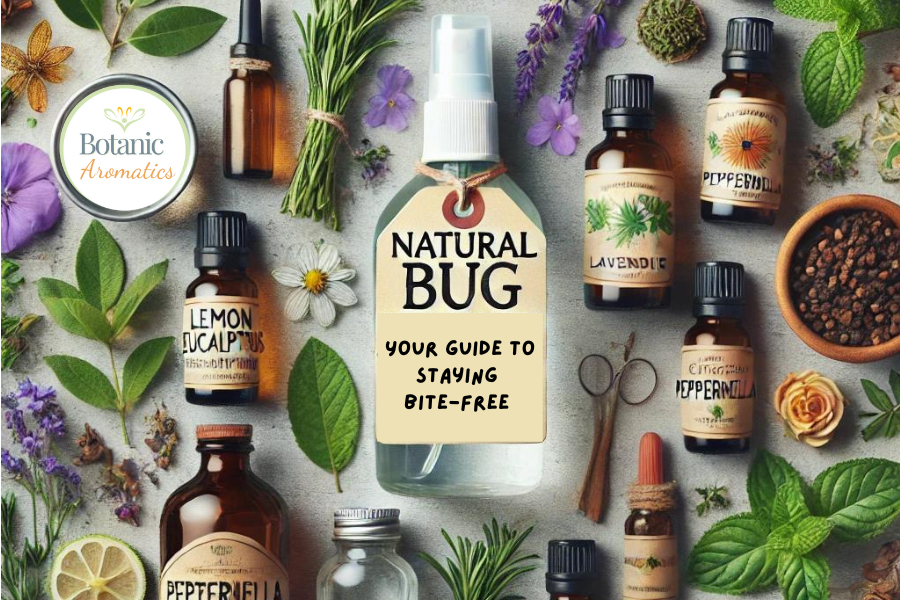Mosquitoes Be Gone!
Welcome to your ultimate guide on natural bug repellents! Whether you’re a millennial adventurer, a young family enjoying the outdoors, a wellness enthusiast, or an eco-conscious professional, this guide is for you. We’ll explore effective essential oils and safety concerns and share a DIY natural mosquito spray recipe. Let’s begin exploring the numerous benefits of choosing natural mosquito repellents over chemical-based products, informing you on the healthier and more eco-friendly options available for a holistic lifestyle.
Effective Essential Oils for Natural Mosquito Repellent
Essential oils are a versatile and user-friendly solution in the world of natural mosquito repellents. Derived from plants, they contain properties that bugs can’t stand. Let’s explore some of the most effective essential oils and their various applications:
Lemon Eucalyptus Oil
Why it works: Lemon eucalyptus oil contains PMD (para-menthane-3,8-diol), a compound proven effective as DEET in repelling mosquitoes. (Carroll, 2006) The scent of this oil is pleasant to humans but incredibly off-putting to insects. (Oshaghi, 2002)
How to use: Dilute 10-20 drops of lemon eucalyptus oil with two tablespoons of carrier oils like jojoba, coconut, or almond oil and apply to exposed skin. Mix it with glycerin and water in a spray bottle for easy application. Glycerin is a natural emulsifier that helps disperse the essential oils in the water. Always shake before using. Try using about one teaspoon of glycerin to an ounce of filtered or distilled water in a spray bottle.
Lavender Oil
Why it works: Lavender oil is known for its calming properties and pleasant fragrance. However, its floral scent is a strong deterrent for mosquitoes (Lane, 2008) and other insects. Since lavender also has antiseptic properties, it may help soothe and heal bites.
How to use: Lavender can be used neat (undiluted), so apply a few drops directly to your skin or mix it with a carrier oils. You can also use it in a diffuser to keep mosquitoes at bay in outdoor areas. You can create a bug spray, too; see the ‘How to use’ section for lemon eucalyptus.
Tea Tree Oil
Why it works: Tea tree oil, also known as melaleuca oil, has a strong medicinal scent and is renowned for its antiseptic and anti-inflammatory properties. This oil not only repels mosquitoes but also helps in treating insect bites.
How to use: Mix 10 drops of tea tree oil with 2 tablespoons of carrier oil and apply it to your skin. Alternatively, add it to a spray bottle with water for a quick and easy insect repellent, following the instructions for lemon eucalyptus.
Peppermint Oil
Why it works: Peppermint oil’s invigorating scent is refreshing to humans but confusing and overwhelming to insects. The menthol content in peppermint creates a cooling sensation and is an effective natural bug repellent.
How to use: Combine 10-15 drops of peppermint oil with a carrier oil and apply it to your skin. Mix it with water in a spray bottle to mist around your outdoor areas.
Citronella Oil
Why it works: Citronella oil is extracted from lemongrass and is a well-known natural insect repellent. Its strong citrus scent masks the natural odors that attract mosquitoes, effectively keeping them at bay.
How to use: Add 10-15 drops of citronella oil to a carrier oil and apply it to your skin. You can also use citronella candles or diffusers outdoors to keep mosquitoes away.
Patchouli Oil
Why it works: Patchouli oil, with its rich, earthy aroma, is a natural deterrent for insects (Mustapa et al., 2023.) It’s also known for its grounding and calming effects.
How to use: Mix 10 drops of patchouli oil with a carrier oil and apply to the skin. You can also add it to a diffuser blend for outdoor use or create a spray following the instructions for lemon eucalyptus.
Clove Oil
Why it works: Clove oil has a strong, spicy scent that effectively repels mosquitoes (Mustapa et al., 2023). It’s also used for its antimicrobial properties.
How to use: Dilute 10 drops of clove oil with 2 tablespoons of carrier oil and apply to your skin. You can also mix it with water in a spray bottle for an easy-to-apply repellent, following the instructions for lemon eucalyptus.
Geranium Rose Oil
Why it works: Geranium rose oil has a sweet, floral fragrance that mosquitoes dislike (Abbas et al., 2013.) It’s also beneficial for skin health.
How to use: Add 10-15 drops of the essential oil to a carrier and apply to your skin. This oil can also be used in diffusers to keep outdoor areas mosquito-free or as a spray.
Safety Concerns with Essential Oils
While essential oils are fantastic for repelling bugs, using them safely is crucial. Following are some tips on essential oil safety. Following these precautions helps you enjoy the benefits of essential oils and avoid any adverse effects:
Dilution is Key: Because carrier oils are highly concentrated and potent, always dilute them before applying them to your skin. Carrier oils like jojoba and coconut are nice for the skin. If you make a spray, the same principle applies: dilute and add an emulsifier to help disperse the oils in the liquid.
Children: Using natural bug repellents with children is generally considered safe, making them a preferred choice over chemical-based alternatives. For young children, it is recommended to use mild oils such as lavender and geranium rose, avoiding more potent oils like clove and eucalyptus. For more information, please read this post.
Patch Test: Allergic reactions are possible, so a path test is another tool to ensure safe use. Always apply a small amount of the diluted oil to a small area of your skin and check it in 24 hours to ensure no adverse reaction.
Avoid Sensitive Areas: Your eyes, nose, mouth, or broken or irritated skin.
Consult a Professional: Consult a healthcare professional if you are pregnant, nursing, or have any underlying health conditions. Although generally safe, certain oils may be unsafe if you are pregnant or have specific health issues.
Store Properly: Essential oils in dark glass bottles should be kept away from direct sunlight and excessive heat to maintain potency and effectiveness. You can learn more about storing them safely here.
DIY Natural Mosquito Spray Recipe
Creating your own natural mosquito spray is not only effective but also simple and rewarding. This recipe is just a guide; feel free to experiment, which is half the fun. Here’s a basic recipe to get you started:
Ingredients:
- 30 ml witch hazel
- 90 ml distilled water
- 15 ml glycerin
- 7 drops of lemon eucalyptus essential oil
- 5 drops of lavender essential oil
- 3 drops of tea tree essential oil
- 3 drops of patchouli essential oil
- 10 drops of geranium rose essential oil
- 2 drops of clove essential oil
Instructions:
Combine: Mix all the ingredients in a clean spray bottle. The bottle should be made of glass or high-quality plastic to prevent reactions to the essential oils.
Shake: Shake well before each use to distribute the oils evenly.
Apply: Spray the mixture onto exposed skin and clothing, avoiding the face. Reapply as needed, especially after swimming or sweating.
This DIY natural mosquito spray leverages the power of essential oils while ensuring that you’re using only natural products. It’s a great addition to your holistic lifestyle and promotes natural wellness.
Why Choose Natural Mosquito Repellents?
Choosing natural mosquito repellents over chemical-based products offers numerous benefits for you and the environment:
Health Benefits: Natural repellents are free from harmful chemicals like DEET, which can cause skin irritation and other health issues with prolonged use. Essential oils provide a safe alternative, especially for children and those with sensitive skin.
Environmental Impact: Conventional repellents contain synthetic chemicals that can harm wildlife and contaminate water sources. Natural repellents, made from plant-based ingredients, are biodegradable and environmentally friendly.
Holistic Approach: Using natural repellents aligns with a holistic lifestyle that values the connection between personal well-being and environmental stewardship. Embracing natural wellness practices supports a healthier, more sustainable way of living.
Additional Tips for Natural Mosquito Prevention
In addition to using essential oil-based repellents, there are other natural strategies you can employ to keep mosquitoes at bay:
Eliminate Standing Water: Mosquitoes can breed in small amounts of still or stagnant water. Regularly empty and clean birdbaths, gutters, flower pots, and other water-collecting containers.
Plant Mosquito-Repelling Herbs: Incorporate plants like basil, rosemary, marigolds, and lemongrass into your garden.
These plants naturally repel mosquitoes and can enhance your outdoor space.
Wear Protective Clothing: Wear long sleeves and pants to reduce exposed skin. Choose lightweight, breathable fabrics to stay comfortable in warm weather.
Use Mosquito Nets: If you’re spending time outdoors or in areas with high mosquito activity, consider using mosquito nets for additional protection.
Maintain Air Circulation: Mosquitoes are weak fliers deterred by strong air currents. Use fans on patios or outdoor seating areas to keep mosquitoes away.
Wrapping it up!
Incorporating natural mosquito repellents into your routine is a fantastic way to protect yourself from bites while staying true to a holistic and eco-conscious lifestyle. You can enjoy the outdoors worry-free by understanding effective essential oils, practicing essential oil safety, and creating your own DIY natural mosquito spray.
Remember, a natural approach benefits you and the planet. Let’s embrace natural wellness together!
We hope this guide has provided helpful information so you can have the confidence to use natural bug repellents safely. Whether you’re part of the Millennials and Gen Z crowd, a young family, a wellness enthusiast, or an eco-conscious professional, there’s something here for everyone.
Following these tips and incorporating natural repellents into your routine can create a safer, more enjoyable environment for yourself and your loved ones. Embrace nature’s power and switch to natural mosquito repellents today!
Don’t Forget
- Share your own experiences with natural mosquito repellents in the comments below!
- Sign up for our newsletter for more tips and recipes.
Stay safe, stay natural, and enjoy the great outdoors!
Citations
Abbas, A., Murphy, C. C., Demiric, B., Wedge, D. E., Sampson, B. J., Kahn, I. A., Baser, K. H. C., & Tabanca, N. (2013). Insecticidal and biting deterrent activity of rose-scented geranium (Pelargonium spp.) essential oils and individual compounds against Stephanitis pyrioides and Aedes aegypti. Pest Management Science, 69(12), 1385-1392. https://doi.org/10.1002/ps.3518
Carroll, S. P., & Loye, J. (2006). PMD, a registered botanical mosquito repellent with DEET-like efficacy. PubMed. https://pubmed.ncbi.nlm.nih.gov/17067054/
Lane, W. A., & Mahmoud, S. S. (2008). Composition of essential oil from Lavandula angustifolia and L. intermedia varieties grown in British Columbia, Canada. NPC Natural Product Communications, 3(8), 1361-1366.
Mustapa, M. A., Guswenrivo, I., Zurohtun, A., Ikram, N. K. K., & Muchtaridi, M. (2023). Analysis of essential oils components from aromatic plants using headspace repellent method against Aedes aegypti mosquitoes. Molecules, 25(11), 4269. https://doi.org/10.3390/molecules28114269
Oshaghi, M. A., Ghalandari, R., Vatandoost, H., Shayeghi, M., Kamali, K., & Samimi, B. (2002). Repellent effect of extracts and essential oils of Citrus limon (Rutaceae) and Melissa officinalis (Labiatae) against main malaria vector, Anopheles stephensi (Diptera: Culicidae). Iranian Journal of Public Health, 32(4)
Disclaimer: The information provided in this content is for educational purposes only and is not intended to diagnose, treat, cure, or prevent any illness or health condition. The use of essential oils and natural remedies mentioned herein should not replace professional medical advice or treatment. We strongly recommend consulting with a qualified healthcare practitioner, such as a physician, aromatherapist, or other experts in integrative medicine, before starting any new health regimen, especially if you have pre-existing health conditions, are pregnant, breastfeeding, or considering the use of essential oils for children. Always perform a patch test for allergic reactions before applying essential oils topically, and follow safe usage guidelines. Your health and wellness are important to us, and making informed decisions with professional guidance is paramount.

Leslie has been a dedicated explorer of holistic remedies for over two decades. Her personal journey has evolved into a thriving business, Botanic Aromatics. Currently completing a certification in professional aromatherapy through Essence of Thyme College of Holistic Studies, Leslie brings a wealth of knowledge and passion to the realm of natural wellness. With a BA in psychology, Reiki mastery, ordained minister, and shamanic practitioner, Leslie combines diverse skills and insights to pursue holistic living. Alongside her holistic ventures, Leslie is an avid writer, committed to sharing information and passionately conveying insights and knowledge to inspire others on their wellness journey. In her business, Leslie seamlessly intertwines research and intuition to craft unique products for health and wellness, embodying a commitment to balance and personal well-being.
Content written in collaboration with ChatGPT4, Co-Pilot, Yoast, Grammarly and Canva

